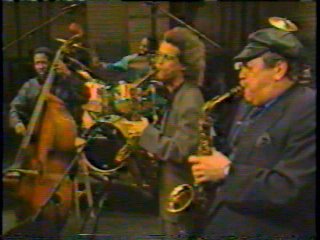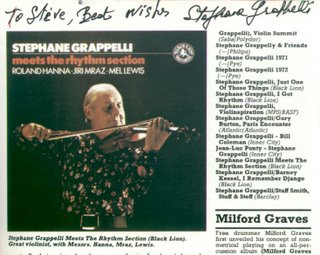A friend sent me this article a couple of days ago. The author is unknown. (If anyone knows who wrote this, let me know and I’ll add an attribution.)
The Elements of JazzPiano:Pianists are intellectuals and know-it-alls. They studied theory, harmony and composition in college. Most are riddled with self-doubt. They are usually bald. They should have big hands, but often don't. They were social rejects as adolescents. They go home after the gig and play with toy soldiers. Pianists have a special love-hate relationship with singers. If you talk to the piano player during a break, he will condescend.Bass:Bassists are not terribly smart. The best bassists come to terms with their limitations by playing simple lines and rarely soloing. During the better musical moments, a bassist will pull his strings hard and grunt like an animal. Bass players are built big, with paws for hands, and they are always bent over awkwardly. If you talk to the bassist during a break, you will not be able to tell whether or not he's listening.
Drums:Drummers are radical. Specific personalities vary, but are always extreme. A drummer might be the funniest person in the world, or the most psychotic, or the smelliest. Drummers are uneasy because of the many jokes about them, most of which stem from the fact that they aren't really musicians. Pianists are particularly successful at making drummers feel bad. Most drummers are highly excitable; when excited, they play louder. If you decide to talk to the drummer during a break, always be careful not to sneak up on him.
Saxophone:Saxophonists think they are the most important players on stage. Consequently, they are temperamental and territorial. They know all the Coltrane and Bird licks but have their own sound, a mixture of Coltrane and Bird. They take exceptionally long solos, which reach a peak half way through and then just don't stop. They practice quietly but audibly while other people are trying to play. They are obsessed. Saxophonists sleep with their instruments, forget to shower, and are mangy. If you talk to a saxophonist during a break, you will hear a lot of excuses about his reeds.
Trumpet:Trumpet players are image-conscious and walk with a swagger. They are often former college linebackers. Trumpet players are very attractive to women, despite the strange indentation on their lips. Many of them sing; misguided critics then compare them to either Louis Armstrong or Chet Baker depending whether they're black or white. Arrive at the session early, and you may get to witness the special trumpet game. The rules are: play as loud and as high as possible. The winner is the one who plays loudest and highest. If you talk to a trumpet player during a break, he might confess that his favorite player is Maynard Ferguson, the merciless God of loud-high trumpeting.
Guitar:Jazz guitarists are never very happy. Deep inside they want to be rock stars, but they're old and overweight. In protest, they wear their hair long, prowl for groupies, drink a lot, and play too loud. Guitarists hate piano players because they can hit ten notes at once, but guitarists make up for it by playing as fast as they can. The more a guitarist drinks, the higher he turns his amp. Then the drummer starts to play harder, and the trumpeter dips into his loud/high arsenal. Suddenly, the saxophonist's universe crumbles, because he is no longer the most important player on stage. He packs up his horn, nicks his best reed in haste, and storms out of the room. The pianist struggles to suppress a laugh. If you talk to a guitarist during the break he'll ask intimate questions about your 14-year-old sister.
Vocals:Vocalists are whimsical creations of the all-powerful jazz gods. They are placed in sessions to test musicians' capacity for suffering. They are not of the jazz world, but enter it surreptitiously. Example: A young woman is playing minor roles in college musical theater. One day, a misguided campus newspaper critic describes her singing as "...jazzy." Viola! A star is born! Quickly she learns "My Funny Valentine," "Summertime," and "Route 66." Her training complete, she embarks on a campaign of musical terrorism. Musicians flee from the bandstand as she approaches. Those who must remain feel the full fury of the jazz universe. The vocalist will try to seduce you and the rest of the audience by making eye contact, acknowledging your presence, even talking to you between tunes. DO NOT FALL INTO THIS TRAP! Look away, make your distaste obvious. Otherwise the musicians will avoid you during their breaks. Incidentally, if you talk to a vocalist during a break, she will introduce you to her "manager."
Trombone:The trombone is known for its pleading, voice-like quality. "Listen," it seems to say in the male tenor range, "Why won't anybody hire me for a gig?" Trombonists like to play fast, because their notes become indistinguishable and thus immune to criticism. Most trombonists played trumpet in their early years, then decided they didn't want to walk around with a strange indentation on their lips. Now they hate trumpet players, who somehow get all the women despite this disfigurement. Trombonists are usually tall and lean, with forlorn faces. They don't eat much. They have to be very friendly, because nobody really needs a trombonist. Talk to a trombonist during a break and he'll ask you for a gig, try to sell you insurance, or offer to mow your lawn.
Picking the TuneEvery time a tune ends, someone has to pick a new one. That's a fundamental concept that, unfortunately, runs at odds with jazz group processes. Tune selection makes a huge difference to the musicians. They love to show off on tunes that feel comfortable, and they tremble at the threat of the unknown. But to pick a tune is to invite close scrutiny: "So this is how you sound at your best. Hmm..." It's a complex issue with unpredictable outcomes. Sometimes no one wants to pick a tune, and sometimes everyone wants to pick a tune. The resulting disagreements lead to faction-building and under extreme conditions even impromptu elections. The politics of tune selection makes for some of the session's best entertainment.
Example 1: No one wants to pick a tune (previous tune ends) (silence) trumpet player: "What the f..@*? Is someone gonna to pick a tune?" (silence) trumpet player: "This s%!* is lame. I'm outta here." (Storms out of room, forgetting to pay tab). rest of band (in unison): "Yes!!!" (Band takes extended break, puts drinks on trumpet player's tab).
Example 2: Everyone wants to pick a tune, resulting in impromptu election and eventual tune selection (previous tune ends) (pianist and guitarist simultaneously): "Beautiful Love!"/"Donna Lee!" guitarist to pianist: "You just want to play your fat, stupid ten-note chords!" pianist to guitarist: "You just want to play a lot of notes really fast!" saxophonist: "'Giant Steps'." (a treacherous Coltrane tune practiced obsessively by saxophonists.) guitarist and pianist (together): "Go ahead, a$%^hole." trumpet player: "This sh^%& is lame. 'Night in Tunisia'." (a Dizzy Gillespie tune offering bounteous opportunities for loud, high playing.) saxophonist: "Sorry, forgot my earplugs, Maynard." (long, awkward silence) pianist, guitarist, saxophonist, trumpet player all turn to drummer: "Your turn, Skinhead." (drummer pauses to think of hardest possible tune; a time-tested drummer ploy to punish real musicians who play actual notes.) drummer: "Stablemates." trumpet player: F..@* this! I'm outta here." (Storms out of room. Bartender chases after him.) ("Stablemates") trombonist: "Did someone forget to turn off the CD player?"
-- Not only are these disagreements fun to watch; they create tensions that will last all through the night. (As an educated audience member, you might want to keep a flow chart diagramming the shifting alliances. You can also keep statistics on individual tune-calling. Under no circumstances, though, should you take sides or yell out song titles. Things are complicated enough already.)
 The picture on the left is a screen capture of Mr. Woods with David Sanborn and his band from the Night Music show. It was a great show that aired in the late 80s at an ungodly hour. The time slot and the music ensured that it was seen by no one. It featured interesting groupings (one performance had Carla Bley and Bootsy Collins) and I still have some of the videotapes I made from it. When I get the time, I’m going to upload them to YouTube. I’ll post a note when I get there.
The picture on the left is a screen capture of Mr. Woods with David Sanborn and his band from the Night Music show. It was a great show that aired in the late 80s at an ungodly hour. The time slot and the music ensured that it was seen by no one. It featured interesting groupings (one performance had Carla Bley and Bootsy Collins) and I still have some of the videotapes I made from it. When I get the time, I’m going to upload them to YouTube. I’ll post a note when I get there.


